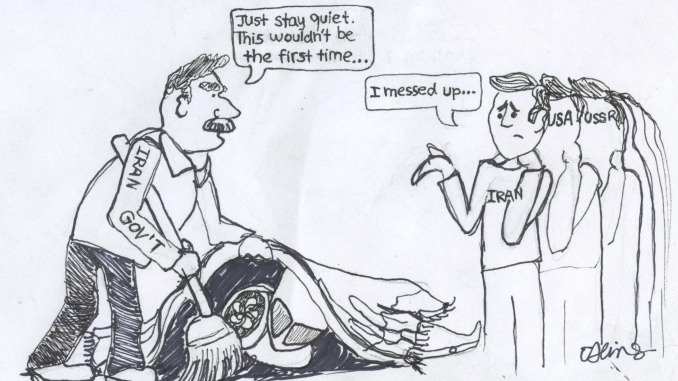
176. This may just be a number. Meaningless digits. But for Iranians, Canadians and Ukrainians, 176 is a tragic, stomach-dropping reminder of the people they lost.
On Jan. 8, 176 people died on Ukraine International Airlines Flight 752 after it was accidentally shot down by Iranian military officials. Passengers included young mothers, children and at least two newly-married couples who were returning from holidays in Iran.
A day before the Boeing 737 crashed, the Iranian military was gearing up to retaliate for the American drone strike that had killed Iran’s top military commander, General Qassim Suleimani, just five days earlier. The Iranian military was on high alert, to say the least, bracing for an American counterstrike.
As a safety precaution, Commander of the Guards’ Aerospace Force, General Amir Ali Jajizadeh, asked officials in Tehran to close Iran’s airspace. But Iranian officials feared that shutting down the airport would insinuate that war with the U.S. was imminent and would therefore create mass panic. Iranian officials also hoped that the presence of passenger jets could act as a deterrent against an American attack on the airport or the nearby military base.
This lapse of judgment — effectively using planeloads of travelers as precautionary human shields — proved to be a fatal mistake.
Out of this horrifying and tragic incident arises a bitterly somber contemplation: could this have been somehow avoided? If there was no American air strike days prior to the plane crash, killing General Suleimani, would these 176 lives still be on this earth?
It would be a mistake to solely point the finger at the military official who fired the missile. The hypervigilance of Iran’s government and military can be traced back to the U.S.’s consistent intervening with Middle Eastern affairs. The assassination of General Suleimani by the U.S. military unleashed turmoil in Iran, and President Donald Trump’s constant belligerent attitude towards the matter only works to aggravate that turmoil. In a way, there is blood on all of our hands.
On the day of the crash, the central Air Defense Command issued an alert that American warplanes had taken off from the United Arab Emirates. Cruise missiles were coming toward Iran.
However, the cruise missile alert was nothing but a false alarm. United States military officials said that no American planes were in or near Iranian airspace that night.
When the officer spotted the Ukrainian jet, he sought permission to fire. But he was unable to communicate with his commanders due to a technical jam, and had to make the call himself. He fired.
While the news of Ukrainian Flight 752 is shocking, the accidental shooting down of a commercial flight is unfortunately not an anomaly.
Over the past 50 years, numerous passenger flights have been shot down during periods of military tensions between rivaling nations. Countries suffer civilian casualties before boots even hit the soil. History retells itself, and the Iranian military accidentally killing 176 people is a heartbreaking reminder that innocent civilians pay the sometimes fatal cost of feuding nations.
When the plane went down, General Hajizadeh advised the generals not to tell the rank-and-file air defense units. The military’s committee and officers involved in the shooting — fully aware of the truth — were hidden away and ordered not to speak to anyone.
It was not until the evening of Jan. 11 that the head of Iran’s military finally acknowledged that they accidentally shot down Ukrainian Airlines Flight 752.
The Iranian government waited three days to announce what should have been made known immediately. The friends, family members and partners of those who died in Ukrainian Flight 752 had to wait three days to hear the truth about what happened to their loved ones.
The admission was shocking. When Iranians — and the world — turned to the government for answers, they were fed lies. This triggered protests in Tehran, which called out the government’s indifference to its citizens’ suffering and the government’s total lack of accountability for its wrongdoing.
Several Iranian social media users have argued that the public would never have been informed of the actual cause of the crash if the plane passengers did not have foreign nationalities and the international community was not pressuring Iran to come clean. This reality is a hard pill to swallow; that nations’ leaders, whose job is to look out for the peoples’ best interests, would choose saving themselves from international embarrassment over taking responsibility for the deaths of 176 deaths of their own people.
The cover-up of a major world event and the lack of accountability signify that human casualties brought on by government feuds are met with a shrug. The dangerous cocktail of misinformation and lack of accountability is a recipe for war, and if we do not recognize that innocent civilians are more than pawns on political strategy boards, then more than 176 lives will be lost.
